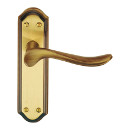| handle |
| 1. 把手 | |
| 2. 可乘之机 | |
| 3. 头衔 | |
| 4. 睹注金额 | |
| 5. 触 | |
| 6. 支使 | |
| 7. 讨论 | |
| 8. 处理经营 | |
| 9. 操作 | |
| 10. 处理 | |
| 11. 把 | |
| 12. 把柄 | |
| 13. 把子 | |
| 14. 辫子 | |
| 15. 柄 | |
| 16. 动手 | |
| 17. 对待 | |
| Components |
|
| 门 |
| 1. Simplified form of 門 | |
| 把 |
| 1. to hold; to grasp; to take | |
| 把握 - to grasp; to control; to master | |
| 媽媽ma 手把手 教 我 寫字。 (Māma shǒubǎshǒu jiào wǒ xiězì.) - My mom held my hand and taught me to write. | |
| 2. to control; to dominate | |
| 把控 (bǎkòng) - to control | |
| 3. to guard; to have control over | |
| 把守 (bǎshǒu) - to guard; to defend | |
| 把門 - to guard a door or gate | |
| 4. (colloquial) to be close; to be near | |
| 5. to hold a baby while it relieves itself | |
| 把尿 (bǎniào) - to hold a baby while it urinates | |
| 6. (TCM) to feel (for the pulse) | |
| 我 替 施主 把 把脈。 (Wǒ tì shīzhǔ bǎ bǎmài.) - Let me feel the pulse for you. | |
| 7. A light verb or preposition placed before the object of a sentence to allow it to be placed before the verb, giving greater flexibility in complex sentence construction. | |
| 他 把 刀 放 在 桌子zi 上。 (Tā bǎ dāo fàng zài zhuōzi shàng.) - He put the knife on the table. | |
| 8. Used before a “subject + verb + complement” structure; to cause to; to make | |
| 真的 把 我 氣死 了! (Zhēnde bǎ wǒ qìsǐ le!) - It really made me so mad! | |
| 9. bundle; bunch | |
| 火把 (huǒbǎ) - torch (stick with a flame on one end) | |
| 10. handle; knob; grip (a part of an object which is held in the hand) | |
| 車把 (chēbǎ) - handlebar (of a bicycle) | |
| 刀把bà (dāobà) - knife handle; hilt | |
| 11. stem (of a flower, leaf, fruit, etc.) | |
| 葉把bà兒r (yèbàr) - stem of a leaf | |
| 三 把 刀 (sān bǎ dāo) - three knives | |
| 四 把 鉸gaau3剪 - four pairs of scissors | |
| 一 把 刀囝 (siŏh bā dŏ̤-giāng, ref=(RQ:Great Dictionary of Modern Chinese Dialects, 1677) - a pocketknife, MD) | |
| 兩 把 掃把 (liǎng bǎ sǎobǎ) - two brooms | |
| 一 把 米 (yī bǎ mǐ) - a handful of rice | |
| 一 把 韭菜 (yī bǎ jiǔcài) - a bunch of garlic chives | |
| 點 一 把 火 - to light a fire | |
| 加 把 勁兒r! (Jiā bǎ jìnr!) - Make an extra effort! | |
| 一 把 年紀 | |
| 幫 你 一 把 (bāng nǐ yī bǎ) - to give you a helping hand | |
| 過癮\過 把 過癮\癮 - to satisfy a craving | |
| 打 把 麻將 - to play mahjong | |
| 玩 兩 把 牌 - to play card games | |
| 打 幾 把 遊戲 - to play video games | |
| 汏浴\汏 把 汏浴\浴 (3da+2po+5hhioq, ref=(RQ:Great Dictionary of Modern Chinese Dialects, 1675) - to bathe, SH) | |
| 12. (Xiamen, &, Quanzhou Hokkien) | |
| 一 把 跤踏車 (chi̍t pé kha-ta̍h-chhia) - a bicycle, MN, ref=(RQ:Great Dictionary of Modern Chinese Dialects, 1677) | |
| 13. Placed after numerals or classifiers to express uncertainty; approximately | |
| 個 把 月 - approximately a month | |
| 十 把 日 (sĕk bā nĭk, ref=(RQ:Great Dictionary of Modern Chinese Dialects, 1677) - approximately ten days, MD) | |
| 隻 把 人 (ciă bǎ nêng, ref=(RQ:Great Dictionary of Modern Chinese Dialects, 1676) - several people, MB) | |
| 14. (archaic or dialectal) to give | |
| 把 壓歲錢 (ba3 'ngat6 sui4 qien2) - to give money (to children) during the Chinese New Year, G | |
| 把 本 書 你 (ba3 ben3 xy1 nyi3, ref=(RQ:Great Dictionary of Modern Chinese Dialects, 1675) - to give you a book, X) | |
| 把 我 一 本 書 - to give me a book, M-YZ, ref=(RQ:Great Dictionary of Modern Chinese Dialects, 1672) | |
| 15. =====Usage notes===== | |
| 16. (zh-wp, zh:把字句, en:bǎ construction) | |
| 手 |
| 1. hand | |
| 2. expert; master | |
| 高手 - master | |
| 3. -ist; -er | |
| 歌手 - singer | |
| 4. convenient; handy; portable | |
| 手機 - mobile phone | |
| 手冊 - handbook | |
| 5. handwritten | |
| 6. (Min Nan) luck in gambling | |
| 7. (Mainland China Hokkien) | |
| 8. (Taiwanese Hokkien) hidden part (general) | |
| 9. (finance) | |
| 10. usage. In many varieties of Chinese south of the Yangtze River, 手 refers to the arm and hand collectively. | |

